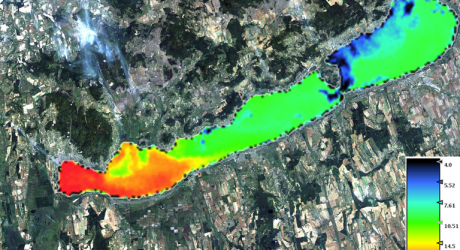A CONSORTIUM of scientists from six UK universities and Research Institutes has been awarded a prestigious £2.5 million grant to create the world’s first satellite-based global lake surveillance system, to monitor how lakes and reservoirs are being affected by environmental change.
Funded by the Natural Environment Research Council (NERC), the consortium project, entitled Globolakes, will be led by Dr Andrew Tyler, Head of Biological & Environmental Sciences at the University of Stirling.
Dr Tyler says: “The University is delighted to be leading this prestigious project which is the culmination of many years of cutting-edge research by Stirling and our consortium partners.
“There are approximately 304 million lakes worldwide which are important for biodiversity and provide many ecological goods and services vital to human survival, such as the supply of fresh water, food and energy. They are also important for the facilitation of carbon cycling, flood alleviation and recreational pursuits.”
Previous research has already shown how the ecological structure and function of lakes can be damaged by external changes such as the influx of certain nutrients, increased sediment load and climate change. Frequently, the changes lead to algal blooms that can deplete oxygen concentrations and produce toxins that are harmful to human health.
“Yet despite their importance and sensitivity to change,” says Dr Tyler, “only a very small number of lakes have been studied consistently and in any detail.
“This world-leading research will enable us to observe the conditions of over 1000 lakes around the globe in a consistent way and also retrospectively, by using archived images from over a decade ago. This will allow us to gain deeper insight into their responses to environmental change and enable us to develop an early warning system to detect the onset of harmful algal blooms.”
GloboLakes will revolutionise lake research, allowing monitoring to be carried out on an unprecedented scale and will provide the power to detect even the smallest changes. Additionally, by monitoring other environmental conditions, the project will produce a step-change in scientists’ ability to understand and attribute the causes of change within lakes – a task which has been arduous thus far.
Professor Stephen Maberly, head of the Lake Ecosystem Group at the NERC Centre for Ecology & Hydrology, concludes: “This project will help to cement the UK’s position at the forefront of international research on freshwater ecosystems and will benefit the environment, society and industry.
“Information garnered will provide essential knowledge on the condition and response of lakes to environmental change, which will prove invaluable for the monitoring and management of lakes and reservoirs in the future.”
Stirling will be heading the consortium, which includes the universities of Dundee, Edinburgh and Glasgow, the NERC Centre for Ecology & Hydrology and the Plymouth Marine Laboratory. The ambitious project is also made possible by the enthusiastic collaboration of over twenty partner organisations around the world.
Ends
For further information, contact Karen McIntosh, public relations officer, on 01786 467058 or k.l.mcintosh@stir.ac.uk
Notes for editors
GloboLakes builds on the forthcoming launch of next generation satellites by the European Space Agency’s programme Global Monitoring for Environment and Security and relies on the latest technological and scientific advancements: improved satellite technology, recent developments in the algorithms for satellite image analysis, and the increase in computing power enabling near-real time processing of large volumes of data.
Satellites due to be launched during the course of the project, called Sentinel 2 and 3, will provide images at greater spatial and temporal resolution allowing data to be gathered from lakes that were previously too small to be observed from space and at a higher frequency.
The project consortium:
University of Stirling, Biological and Environmental Sciences, School of Natural Sciences, led by Dr Andrew Tyler and Dr Peter Hunter
NERC Centre for Ecology & Hydrology, Lake Ecosystem Group, led by Professor Stephen Maberly and Dr Laurence Carvalho
Plymouth Marine Laboratory, Earth Observation Group, led by Steve Groom
University of Dundee, School of the Environment, led by Dr Mark Cutler and Dr John Rowan
University of Edinburgh, School of Geosciences, led by Dr Christopher Merchant.
University of Glasgow, School of Mathematics and Statistics, led by Dr Claire Miller and Professor Marian Scott.
Web links are as follows:
(i) GloboLakes (http://www.globolakes.ac.uk)
(ii) ChloroGIN (http://chlorogin.org/)
(iii) Group on Earth Observations (GEO: www.earthobservations.org)
(iv) Global Lake Ecological Observatory Network (GLEON: www.gleon.org)
(v) Arc-Lakes (http://www.geos.ed.ac.uk/arclake/)
(vi) European Space Agency’s GMES programme (http://www.esa.int/esaLP/LPgmes.html)
MEDIA RELEASE posted by the University of Stirling. You too can post media releases on www.allmediascotland. For more information, email here. And do feel free to follow www.twitter.com/allEducationPR.
Contact: Karen McIntosh
Phone: 01786467058
Email: pr@stir.ac.uk
Website: http://www.stir.ac.uk







